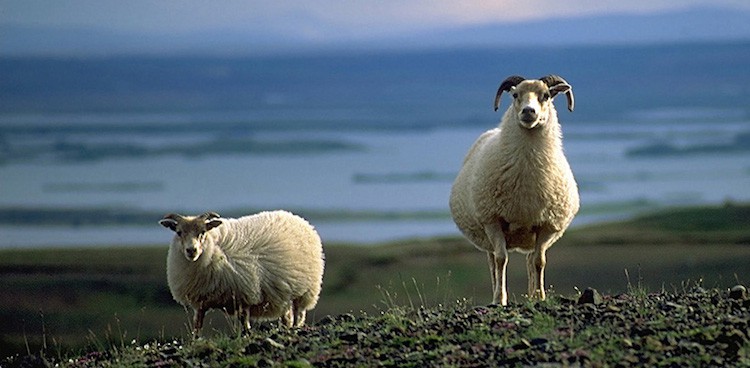
Origin
The Icelandic sheep is a triple-purpose breed that can be used for meat, milk, and fiber production. First brought to Iceland from Northern Europe by Vikings around the late eighth century, the sheep are good foragers with large rumens (special stomach compartments), which made them valuable for their ability to withstand harsh Icelandic winters and survive on a thin pasture. The efficiency and vitality of Icelandics also made them an economical option for poor farmers who couldn’t provide a steady supply of hay or other feed for their animals.
Leadersheep
Icelandic flocks have natural leaders, aptly named “leadersheep,” who possess keen survival instincts, a high level of intuition, and a strong sense of direction. In Iceland leadersheep were especially invaluable to shepherds because they could be trusted to lead all other sheep home to safety during unpredictable weather.
Appearance and Temperament
Icelandics are sturdy, medium-size sheep with short tails and stocky bodies, weighing about 130-160 pounds for females and 175- 220 pounds for males. Their fleece has two parts: the soft undercoat and the coarser overcoat. Icelandic wool varies widely in pattern and color and is used to produce lopi, a fiber that’s popular with wool craftsmen.
Icelandics are generally very alert animals. They can be easily spooked and will sometimes become aggressive when agitated. However, with a firm but sensitive upbringing, they can be perfectly friendly and even affectionate, says Deborah Pikovsky of Star Thrower Farm in Minnesota, an all-Icelandic sheep dairy with a flock of 700.
Milk and Cheese
Compared to other dairy sheep breeds such as Friesians, Icelandics provide a smaller amount of milk. But what Icelandics lack in quantity they make up for in quality. “I don’t think I can find a richer, more beautiful milk to make farmstead cheese [with] in the US today than Icelandic,” says Pikovsky, noting that Icelandics’ milk is relatively high in fat, with a sweet flavor.
The milk can be used to make a variety of cheeses and other specialty dairy products, including Iceland’s traditional yogurt cheese, Skyr. Star Thrower Farm produces many farmstead cheeses, such as Camembert-style wheels, aged tommes, ricottas, and blues. These dairy products are creamy and rich in texture and often exhibit flowery notes because of the sheep’s fresh diet of grass, plants, and legumes.




